
Best of Indonesia Itinerary
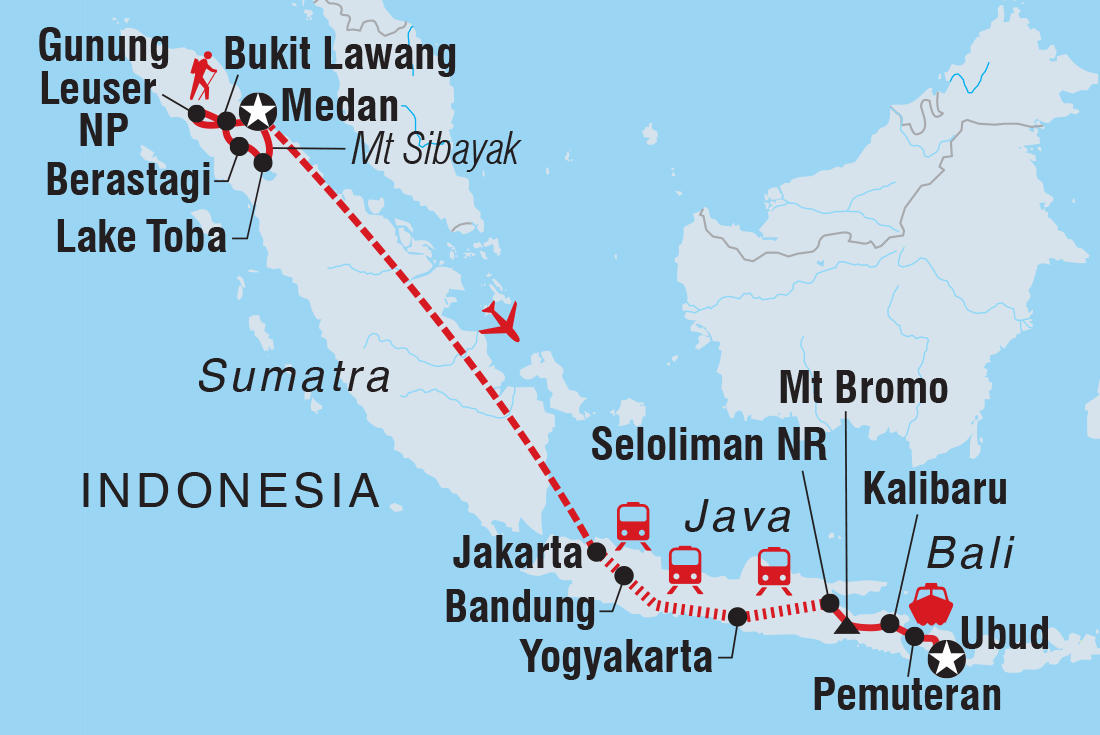


Selamat datang! Welcome to Indonesia. The adventure begins with a welcome meeting at 6 pm. If you happen to arrive early, perhaps check out Maimun Palace – designed by a Dutch Architect and built in the 19th century, it combines architecture from Malay, Indian and Islamic cultures and is now a museum. Alternatively, buy a ticket and take a guided tour of the museum at Tjong A Fie Mansion – known as ‘the historical jewel in Medan’, the Tjong A Fie was built in 1895 by a hakka merchant and is modelled on the Cheong Fatt Tze mansion in Penang. After your meeting, maybe grab some street food at one of the night markets in town.
Jump aboard a private vehicle and drive to Bukit Lawang. The first part of the journey involves quite heavy traffic, but the roads are nice and smooth. Closer to Bukit Lawang it gets bumpy and windy, so brace yourself for a bit of an adventure. The reward for the journey is Bukit Lawang – a peaceful village on the banks of the Bohorok river, right next to the Gunung Leuser National Park. In the afternoon you can take an optional tour in the countryside by becak (cycle rickshaw) or cool off with a refreshing swim in the river. There will be also be plenty of time to prepare for your jungle trek.
Set off on your trekking adventure through the Gunung Leuser National Park with an experienced guide. This UNESCO World Heritage site and Wildlife Heritage Area spans 7927 sq km and is one of the world's most diverse ecosystems. It's the home of many endangered species, including the Sumatran tiger, rhinoceros and elephants. These animals are extremely rare, but you’ll get the chance to go in search for wild orangutans. There used to be an orangutan rehabilitation centre here, but now these creatures have all been returned to their natural habitat, so this is your best chance in Indonesia to see orangutans in the wild. There are also 300 species of birds and many rare plants and flowers. Along the way, your guides will point out orangutan nests, edible plants for you to try, monkeys and birds. Tonight you’ll camp in the jungle – enjoy the atmosphere of the wild as the sun goes down and the guides cook dinner for the group.
Today, your adventure takes you deeper into the heart of Gunung Leuser National Park. Following a hearty breakfast, head out on another invigorating trek, this time in a new direction, promising even more opportunities to encounter the park's incredible wildlife. Let the lush surroundings envelop you in a natural symphony of sights and sounds, then return to the guesthouse in Bukit Lawang to unwind in the afternoon. Settle in for a restful evening, surrounded by the sights and sounds of the jungle.
Say goodbye to the jungle this morning and head out for Berastagi – the home of the Karo people, a Batak sub-group with traditional villages (long houses) and your destination for the next two nights. Arrive after lunch, then enjoy the free time to explore at your own pace or take the opportunity to rest and recharge after two long days of trekking.
Your day starts with a short drive to the starting point of today's hike, which will bring you to the top of the Sibayak Volcano (2094 m). The trail can be quite steep, muddy and slippery, especially in the wet season. You’ll follow a shady jungle path which, towards the top, opens into an alpine setting. Long pants are essential to protect you from poisonous plants, and a trekking stick will also come in handy! From the summit, you can see (and hear) the steaming vapours escaping from the fumaroles of this active volcano. After the descent, sit down for a traditional bungkus lunch just in time to reward your hardwork on the hike and enjoy the views. You’ll then head back for a relax. You may also choose to go to the nearby hot springs for a soothing soak – after a few days of trekking, relaxing in these pools, which are all naturally heated by the volcano, will be a welcome relief.
This morning, head to Lake Toba – surrounded by mountains, this spot is a peaceful place to relax. Formed by a huge volcanic eruption 70,000 years ago, a second eruption 50,000 years later created an island the size of Singapore in the middle of the lake (Samosir Island). Stop at Dokan Village along the way, where you'll find the traditional homes of local Batak families. From here, take a ferry across the glistening waters to Samosir Island, then drive to your lakeside accommodation. You have a free night to unwind and immerse yourself in the serene ambiance – your accommodation is right next to the lake and there’s nice views of the water, mountains and rice fields.
Embark on a day tour in Samosir today. Visit the Stone Chairs and the Simanindo Museum (in a traditional house). You’ll also travel up to a viewpoint on the island which gives you a panoramic vista of Lake Toba and the surrounding Sumatran countryside. Walk through nearby rice fields and stop by a local Batak house for a traditional lunch. Toba Island is dotted with many ancient and modern grave sites, several of which you’ll see today. You’ll also have the chance to attend a traditional Batak dance performance!
Say goodbye to Lake Toba, then drive to the Lake Port. Hop aboard a rustic wooden boat and glide to Tiga Raja Port. Take a moment to peruse the stalls of the weekly market nearby if it happens today, then head on to Medan. This is a bit of a travel day, but the passing landscapes are perfect to pass the time if you can grab a window seat! Arrive in Medan in the late afternoon, then maybe head out for a farewell dinner with your group and local leader, celebrating an amazing adventure.
Today, you’ll fly from Medan to Jakarta after breakfast. When you arrive, enjoy some free time in Jakarta check out some of the museums –maybe explore the Wayang (puppetry), Balai Seni Rupa (fine arts) and Maritime museums. The National Museum is also great for first-time visitors. Maybe check out the Monas (National Monument), dedicated to the spirit of the Indonesian people. You’ll have another welcome meeting at 6 pm tonight to meet the new members of your group. After, maybe head out to dinner to get to know each other better.
Familiarise yourself with the city on a full-day tour of Jakarta with your local leader. Take in Sunda Kelapa port – where the Dutch first landed, temple-filled Chinatown and the old town of Batavia. See Si Jagur – an old Portuguese cannon ornately decorated with a disguised meaning. Visit a Chinese mansion (Chandra Naya) and gain an insight into the beautiful Peranakan architecture. Wander Fatahillah Square, then explore the religious side of the city at Cathedral Church and Istiqlal Mosque – the largest mosque in South East Asia. Tonight, you’re free to find some delicious local eats – just ask your leader!
This morning, take a train to Bandung – a former Dutch city which now boasts a thriving art, shopping and cafe scene. When you arrive around lunch time, you’ll head out for a street food crawl at the Paskal Food Market. Maybe try some satay skewers, gado-gado (a traditional Indonesian salad made from boiled eggs and vegetables) or roasted chicken with rice and vegetables. After, walk off the full belly with a heritage walk through Braga Street – once the centre of local development, this street was home to the first shopping arcade in Bandung, with lots of art deco buildings, shops and a cinema. Sit down for a cup of coffee (in a locally beloved one) and watch the world go by.
Today you’ll head out of Bandung for a day trip to the largest volcano in West Java – Tangkuban Perahu, the only volcanic mountain in Indonesia that you can drive to – and its lush surroundings. Circled by pine forests and tea plantations, you’ll soak up the views as you learn about the unique history of the volcano. Take a walk around the craters with your leader, then head to the Ciater Hot Springs. Along the way, visit a local tea plantation to learn about the tea industry in Java, then continue to the hot springs for a relaxing soak to soothe the muscles. Later, you have a free afternoon and evening back in Bandung.
This morning, catch a train to Yogyakarta. This town is one of South East Asia's real gems! Known as Java's cultural heart, Yogyakarta has a great atmosphere and is perfect to explore on foot. From batik workshops to the nearby Hindu and Buddhist temples, Yogya offers a great array of cultural avenues to explore. When you arrive, you’re free to explore at your own pace – just ask your leader for recommendations.
Rise early to avoid the crowds at Candi Borobudur – the largest Buddhist structure on earth. This UNESCO World Heritage site is set in a tranquil park and as you approach, you'll see the temple rise before you, looming among tropical foliage. With your local guide, follow the route of ancient pilgrims, circling the mandala-shaped structure from the early realms towards Nirvana. After, you have a free afternoon. You might like to visit one of Yogya's other heritage temples – Prambanan Temple is the largest Hindu complex in Java. Tonight, perhaps catch a performance of the Ramayana Ballet – your leader will be able to check dates and availability for you.
Pedal out of the city on a cycling tour through the rice fields and countryside surrounding Yogyakarta. See the locals making various goods, from bricks to tofu and tempeh. Pass palms, lush green grasslands and the odd burst of yellow and pink flowers by the side of the road, which make for great photo opportunities! After, you have a free afternoon to maybe take on a cooking class where you can learn about Indonesian cuisine. Or, why not salute the sun with a yoga class.
Travel by train, then minivan to Seloliman Nature Reserve today. This peaceful reserve sits on the slopes of the sacred volcano, Mt Penanggungan. When you arrive, you’ll meet some of the volunteers working at the Seloliman Environmental Education Centre and learn about what they do here. For lunch, sit down for some delicious, locally grown organic produce cooked by their staff. The centre's accommodation is atmospheric, even with open-air bathrooms built in harmony with the surrounding forest, so take this opportunity to relax this afternoon. This is a beautiful spot to appreciate nature, sit under the stars as the sun goes down and spend an evening technology-free!
Join the reserve staff on a walk around the property this morning, learning about the local environment and the Javanese tradition of herbal medicine. You'll gain an insight into the region’s flora and fauna, traditional farming methods, rice production and the mini hydroelectricity plant. Finish up with a traditional jamu demonstration and a tasting of this Javanese herbal medicine. Then, travel to Mt Bromo – the homeland of the Tenggerese. The still-active volcano – standing at 2329 m – is the most well-known of the Tengger massif. Retire early tonight in preparation for tomorrow's early start.
Your early start today (around 3 am) will be well worth it! First, drive to a lookout point in jeeps to catch the sunrise over the sea of sand. After, you’ll climb up to the volcano crater to take a peek inside – the ascent is not too difficult (approximately 45 minutes), but it can be very cold, so don't forget to bring extra layers of clothing. It's also worth bringing a scarf to cover your nose and mouth, as it can get dusty. Return to the hotel to freshen up and then depart midmorning to Kalibaru by taking a local train. Tonight, you’re free to relax by the pool or perhaps indulge in a local massage.
Head out early this morning to tour some nearby coffee and cocoa plantations. You'll see how coffee is dried and if there’s time, how cocoa is fermented. Before you set off, enjoy a nice cup of coffee or tea and snack on fried bananas – yum! Travel by minibus to the far eastern end of Java – Gilimanuk. There is often a lot of heavy traffic on this stretch of road as it's the main entry point for Bali, so there may be some delays. Next, you'll board a ferry across the Java Strait, then another minibus for a journey along the west coast of Bali to Pemuteran – your destination for the next two nights.
Enjoy a relaxing day in this gorgeous beachside location. Maybe start the day with a yoga class and then explore the local area at your own pace. You could visit the surrounding monkey-filled temples, go swimming off the coast, or think about booking in a snorkelling or diving expedition to the turquoise waters of Menjangan Island. Otherwise, simply sit back, relax and watch the fishermen go about their day-to-day on one of the beaches.
Make the journey to Ubud today – the leafy-green natural paradise of Bali. On the way, stop in at Taman Ayun Temple, to take in the impressive Balinese architecture while you stroll around the gardens. Ubud is Bali's main arts and cultural centre with lots of markets, shops and warungs, close to verdant rice terraces and lush jungles. With nature and wellbeing at its core, Ubud is a highland haven popular with travellers. Tonight, why not get a group of your travel pals together and find a local place to eat some traditional Balinese cuisine.
Your trip comes to an end after breakfast this morning. There is plenty to see and do in Ubud, so it’s highly recommended you stay another few days to explore. If you do, maybe hire a bicycle and explore the surrounding rice paddies and small villages, or visit the galleries, museums and handicraft merchants in town. If you would like to spend more time in Ubud, just get in touch with your booking agent ahead of time.

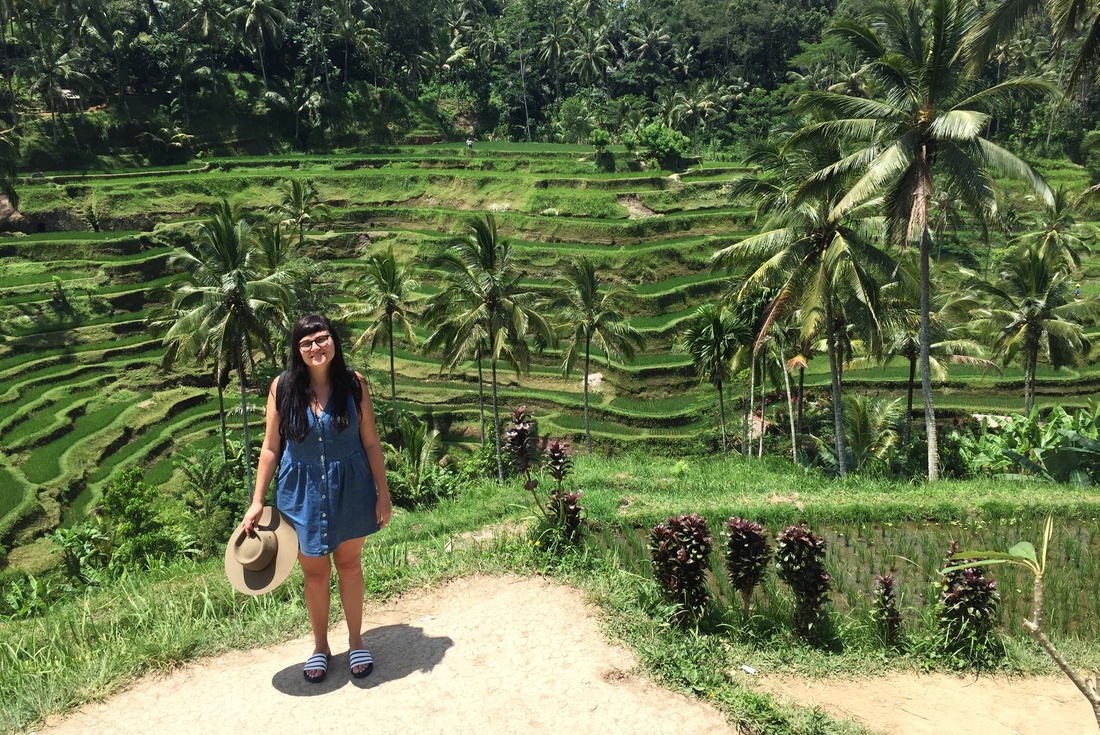
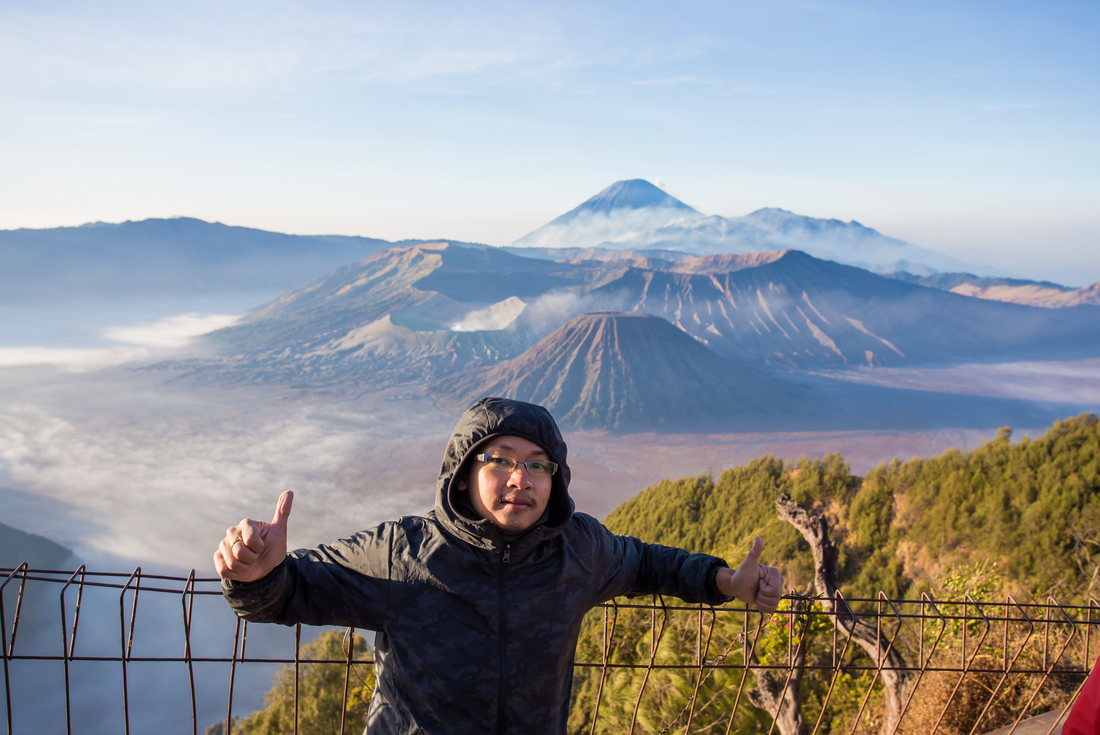
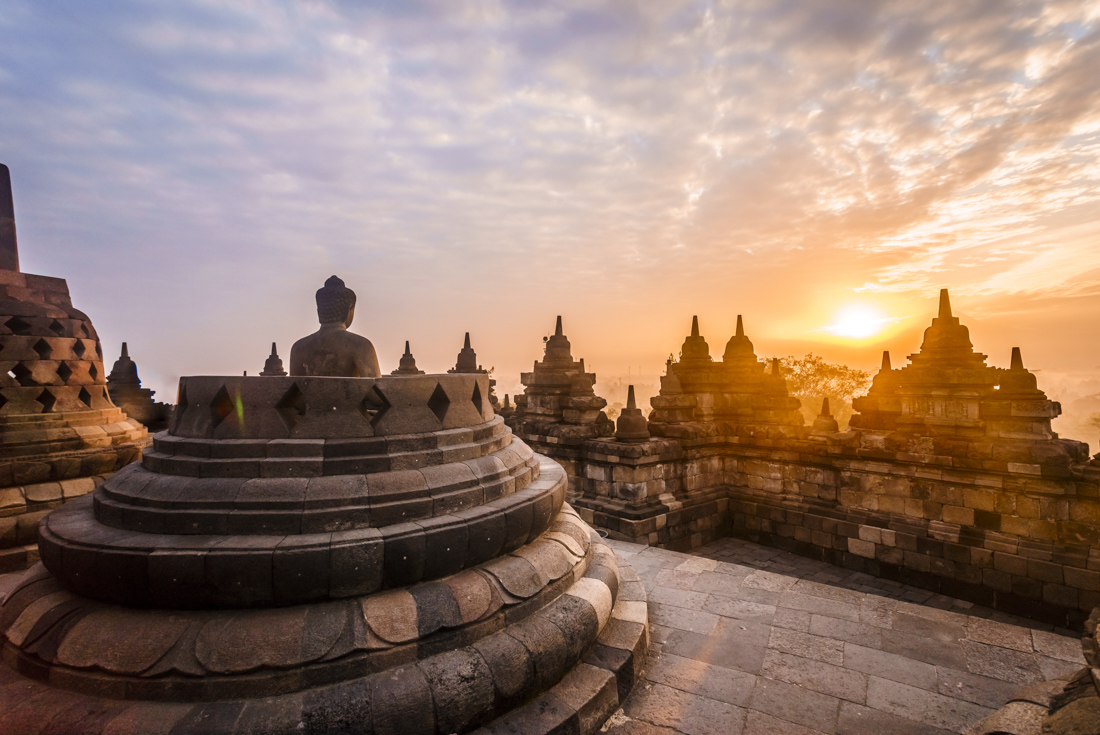
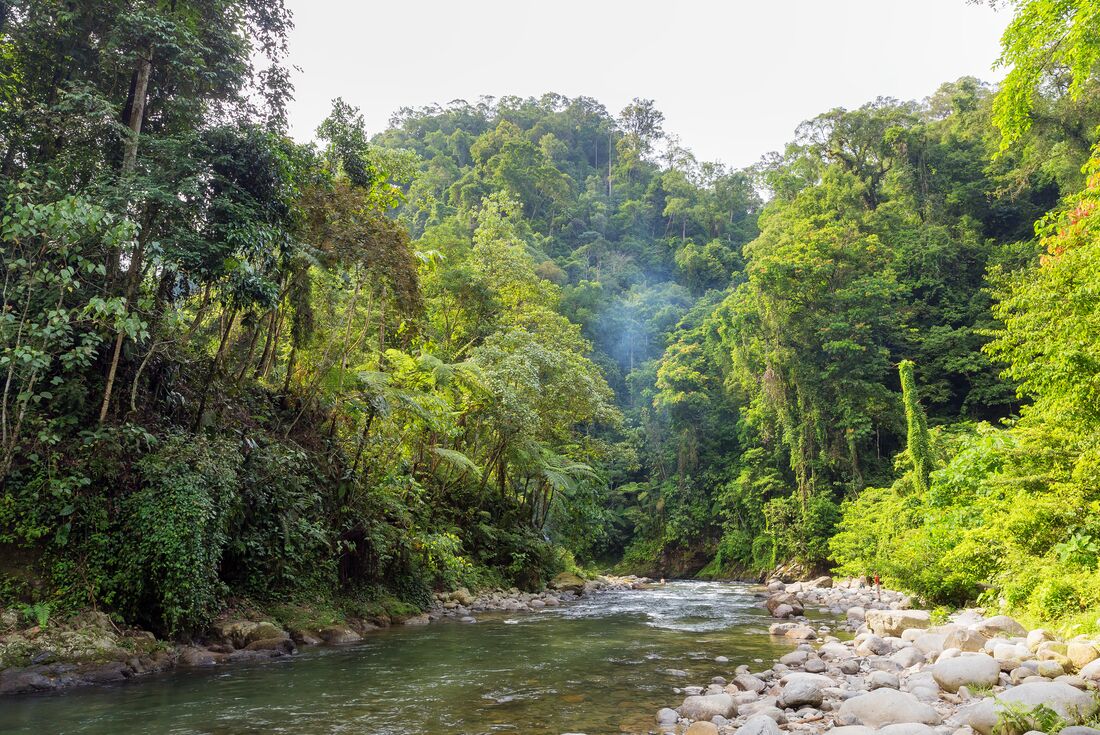
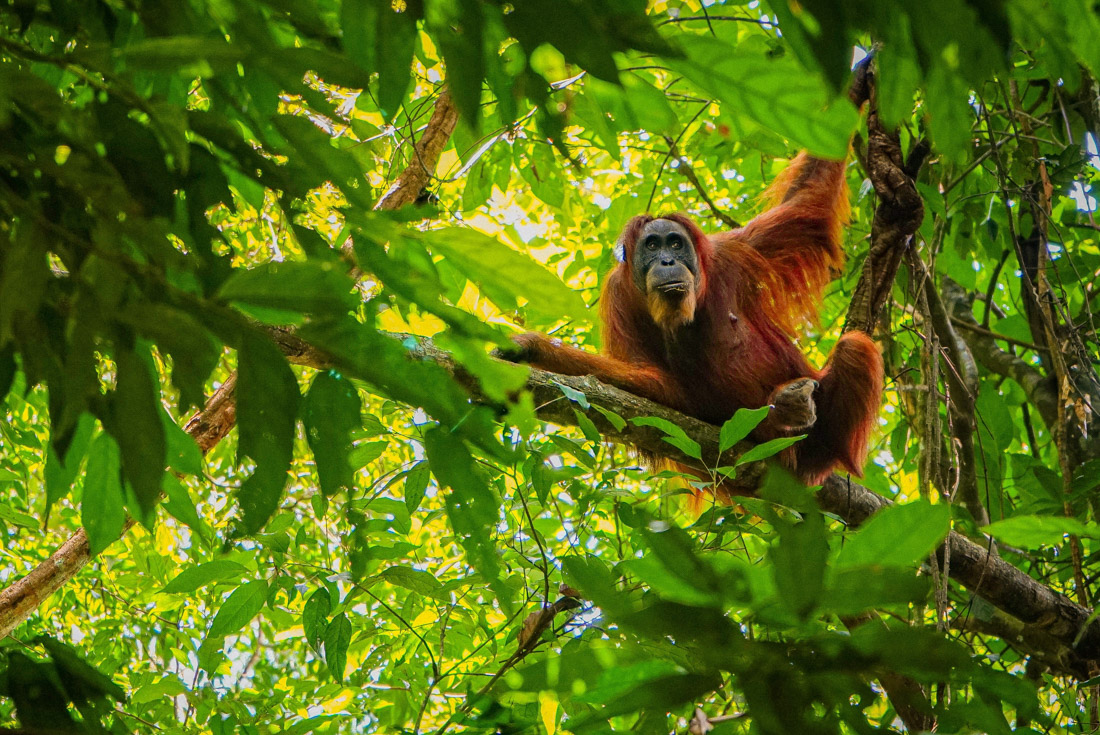
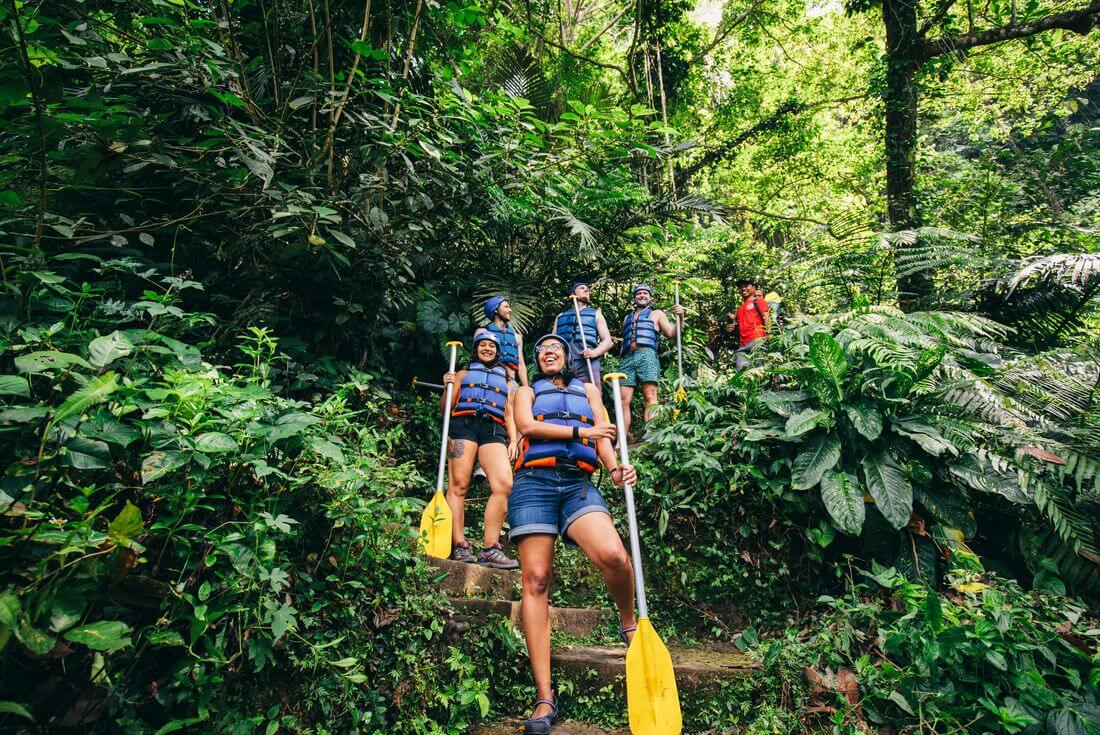
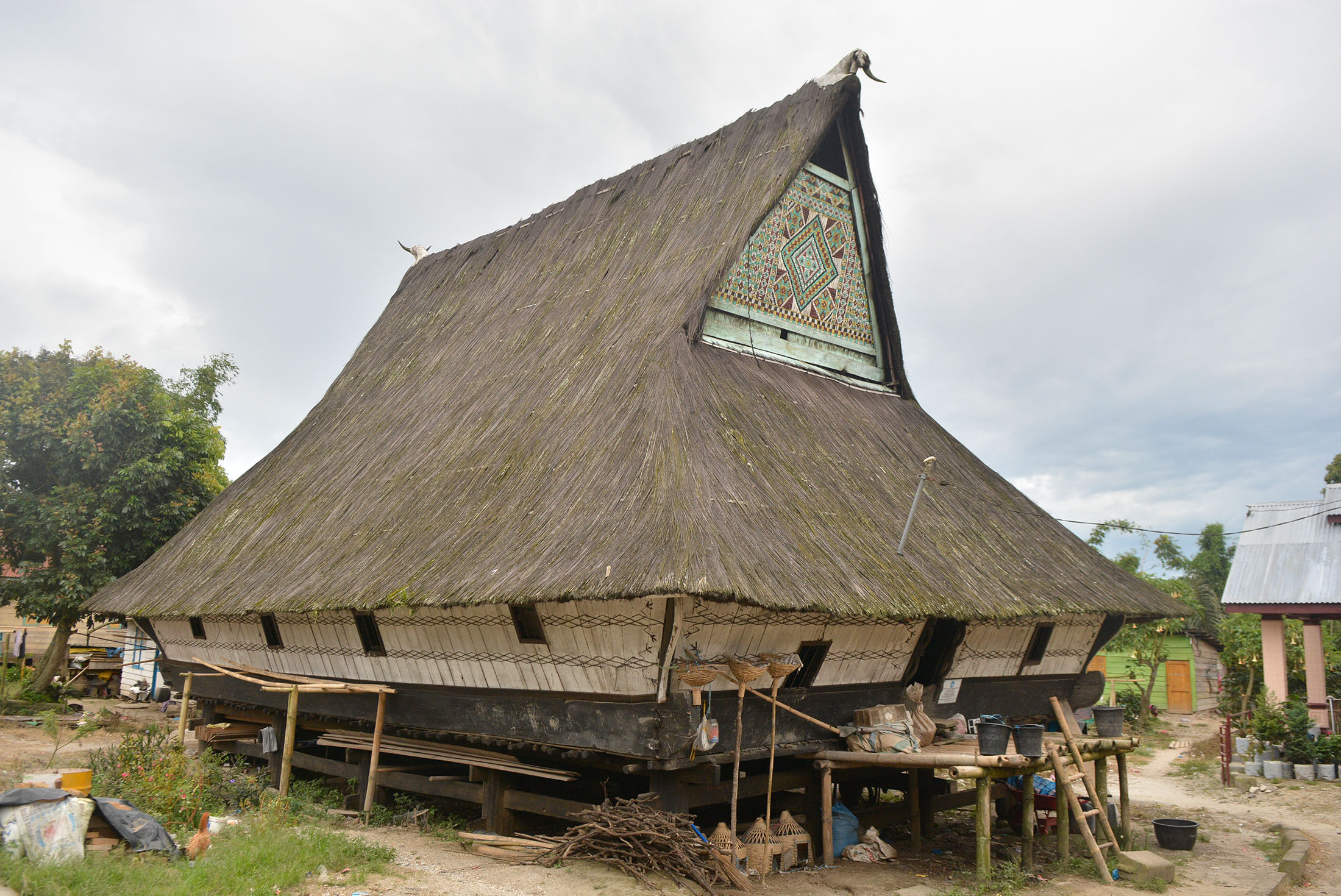
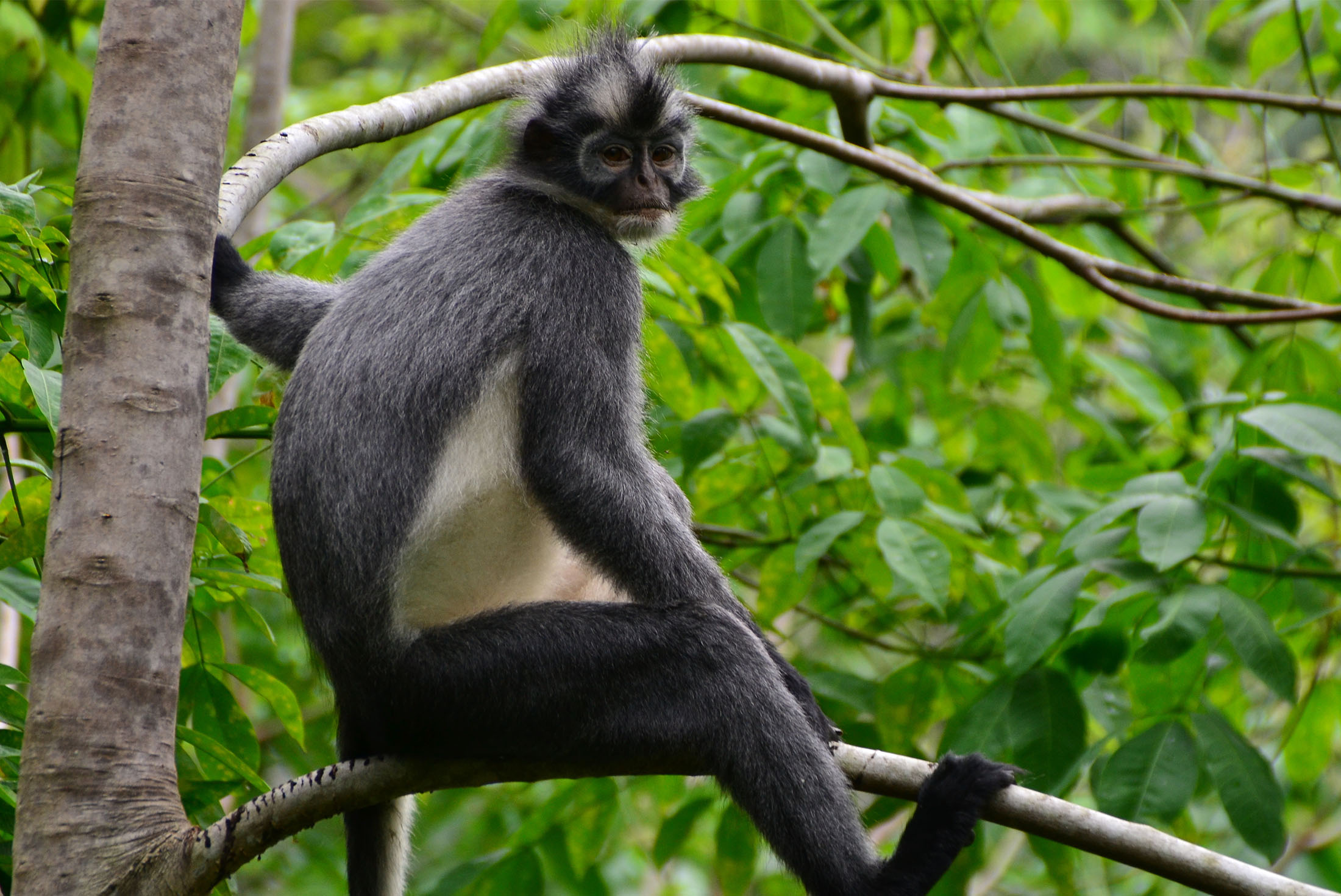
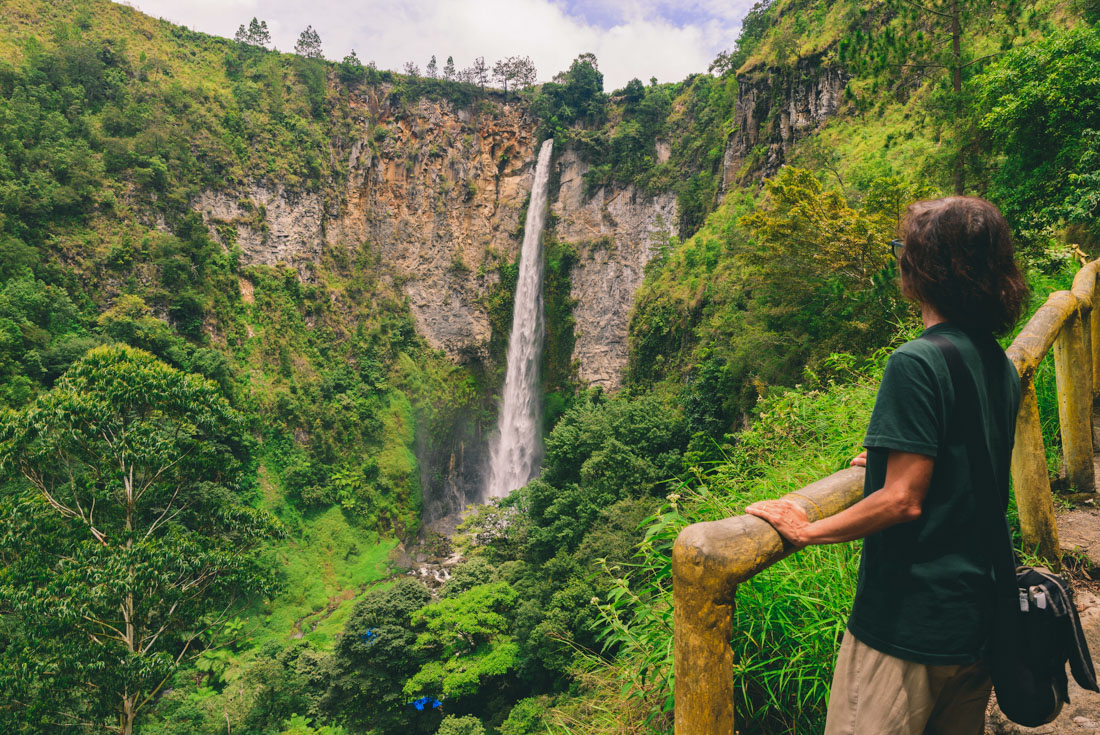
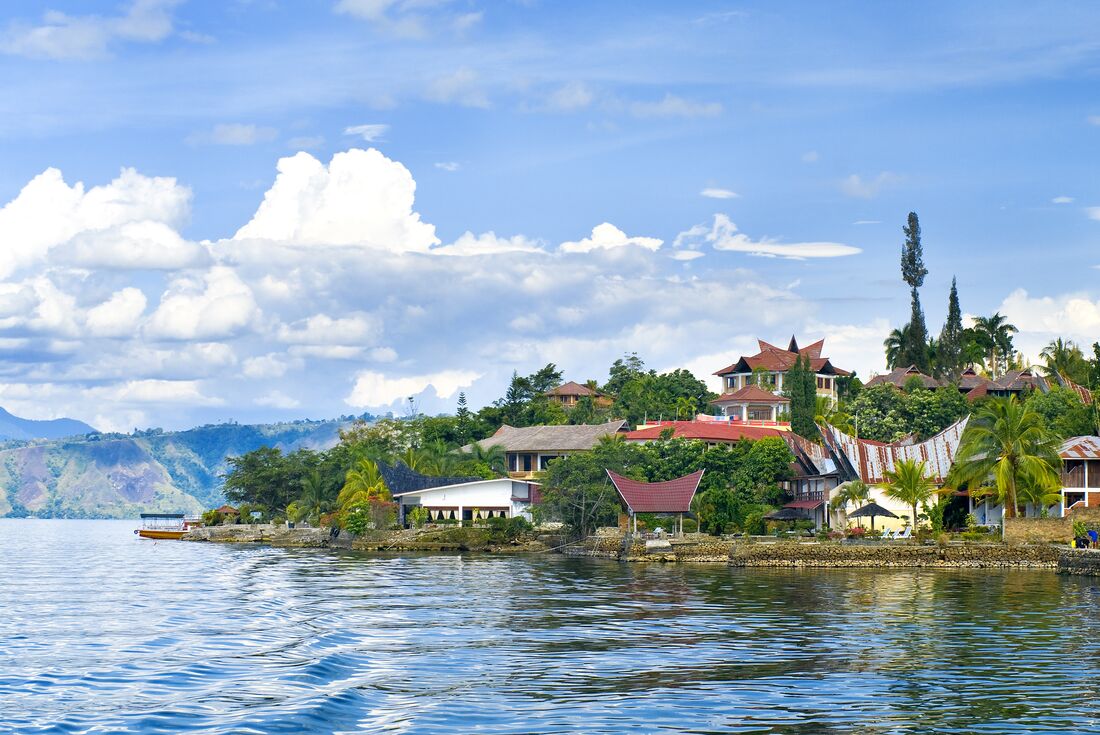
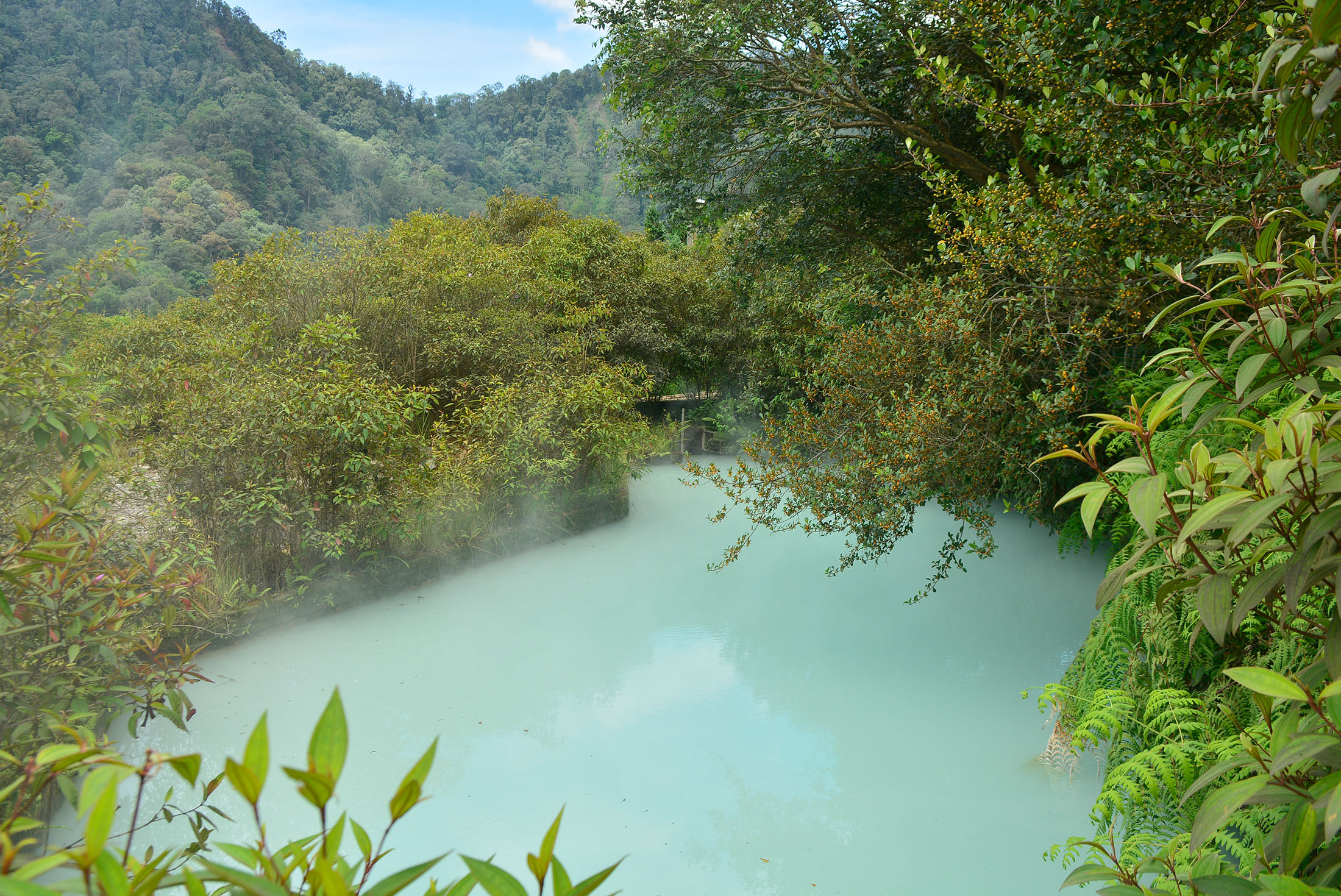
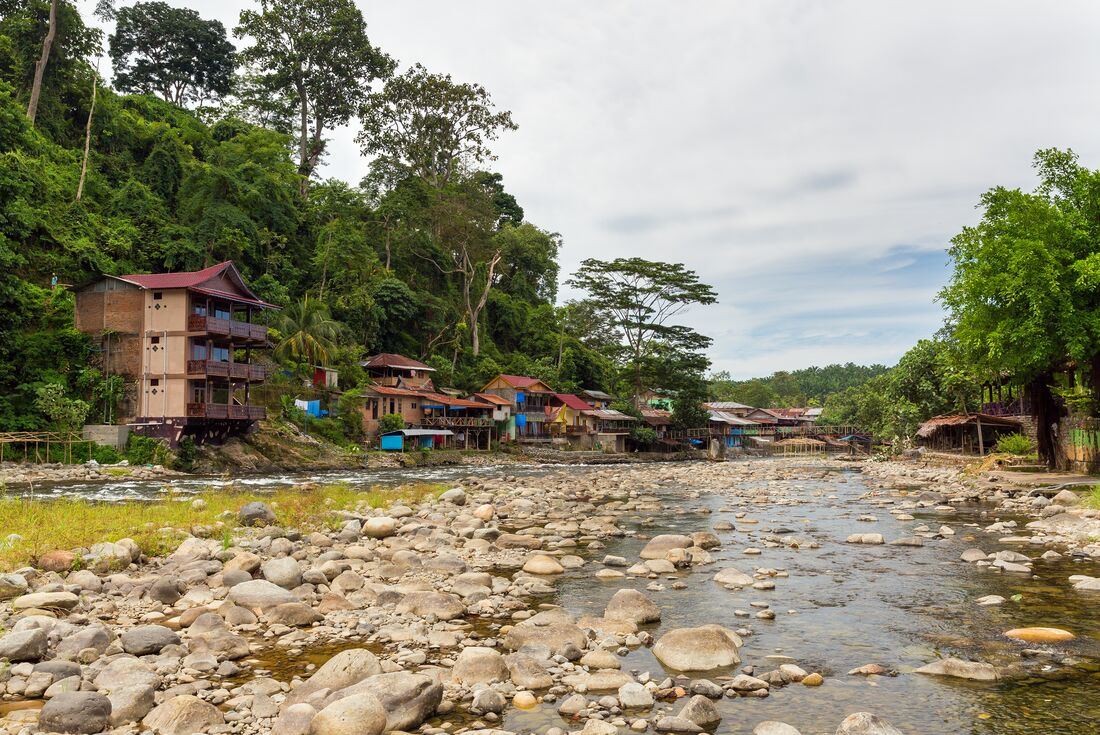
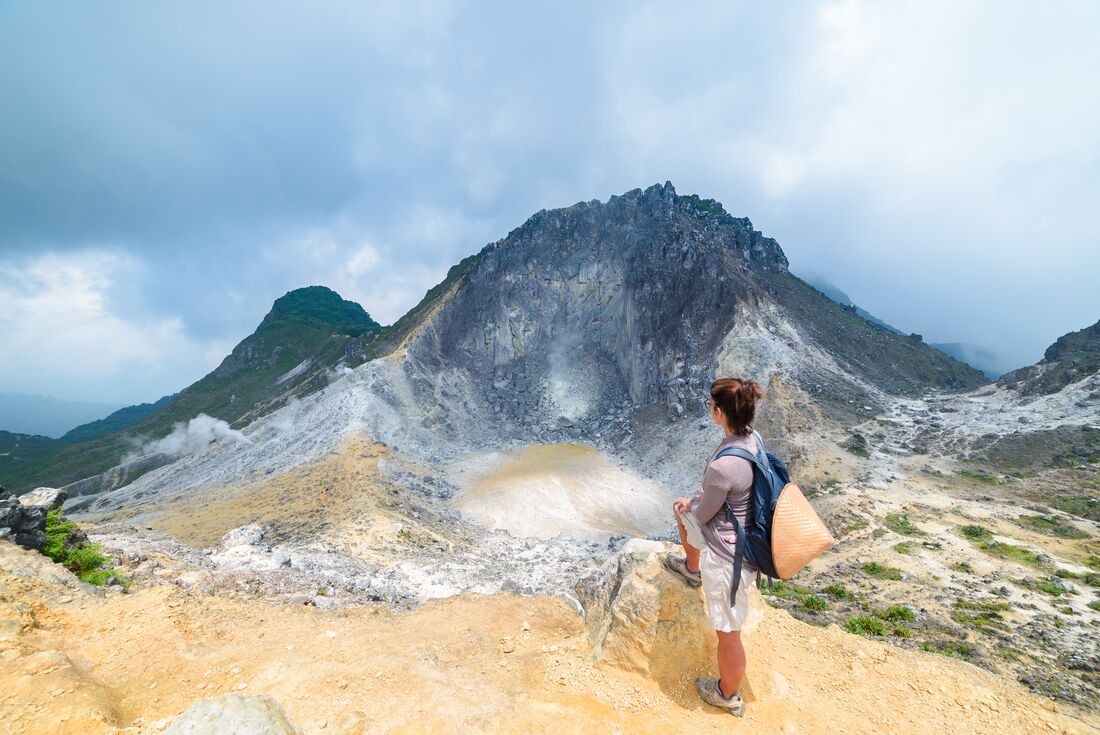
Gunung Leuser NP - Jungle Wildlife Trek
Gunung Leuser NP - Trekking Lunch
Gunung Leuser NP - Campsite Dinner
Gunung Leuser NP - Jungle Wildlife Trek
Mt Sibayak - Volcano climb
Berastagi - Hot springs
Lake Toba - Sipiso-Piso Waterfall
Lake Toba - Samosir Island day tour
Lake Toba - Stone Chairs
Lake Toba - Simanindo Museum
Lake Toba - Batak Dance Performance
Jakarta - City tour
Bandung - Paskal Food Market Street Food Crawl
Bandung - Heritage Walk
Bandung - Tangkuban Perahu Mountain & Crater Walk
Bandung - Tea Plantation
Bandung - Natural Hot Spring
Borobudur - Temple Tour
Yogyakarta - Countryside cycling tour
Seloliman Nature Reserve - Environmental Education Centre Visit
Seloliman Nature Reserve - Environmental Education Centre Lunch
Seloliman Nature Reserve - Environmental Education Centre Dinner
Seloliman Nature Reserve - Guided Walk & Herbal Drink Tasting
Seloliman Nature Reserve - Environmental Education Centre Lunch
Mt Bromo - Sunrise climb
Kalibaru - Coffee and Cocoa Plantation Tour
Mengwi - Taman Ayun Temple
Spot orangutans in the wild in Gunung Leuser National Park for the best opportunities in all of Indonesia. This diverse ecosystem is also home to some 300 bird species and the endangered Sumatran tiger!
Stay in the Bukit Lawang Eco Lodge for a unique jungle experience – you'll also be supporting the Sumatran Orangutan Conservation Program!
Climb the Sibayak Volcano, picnic at the summit, then relax in the local hot springs. For your second trekking adventure, you’ll climb Mt Bromo and if conditions allow, be treated to sunrise views over mist-laden volcanoes.
Cycle through Yogyakarta’s backcountry, riding through a world of flower-studded fields and friendly, smiling locals.
Walk through the jungle and rice paddies of Seloliman Nature Reserve, learn about local herbs then sit back, relax and soak up the ambience under the stars.
Swiss-Belinn Medan, Jalan Surabaya 88 , Medan, INDONESIA, Phone: +62 6141077777, Fax: +62 614520505
Nick’s Pension Hotel, JL. BISMA NO.32, UBUD, , Centre of Ubud, Ubud, 80571, INDONESIA, Phone: +62 361975636
1. A single supplement is available if you’d prefer not to share a room on this trip. The single supplement excludes Day 3, 17 &18 where you will be in shared accommodation and is subject to availability. Please speak to your booking agent for further information.
2. In order to book the train tickets on this trip we require your full passport details at time of booking, or at the latest 45 days prior to travel. Ticketing fees may apply for amendments to details within 45 days of departure, and in some cases you will be required to cover the cost of issuing a new ticket or alternative transport costs.
3. As this is a combination trip, your group composition as well as your leader may change in Jakarta.
4. The luggage limit for flight from Medan to Jakarta is 15kg.
While we always endeavour to provide the best possible holiday experience, due to the nature of travel and the areas we visit sometimes things can and do go wrong. Should any issue occur while you are on your trip, it is imperative that you discuss this with your group leader or local representative straight away so that they can do their best to rectify the problem and save any potential negative impact on the rest of your trip.
We recognise that there may be times when your group leader or local representative may not be able to resolve a situation to your satisfaction - if this is the case, please ask the group leader or local representative to speak to their direct manager.
You may also choose to provide details in your online feedback, which we ask you to complete within 30 days of the end of your trip. Please do be aware that it is very difficult for us to provide any practical help after the trip is completed, so informing us while still travelling will give us the opportunity to resolve the issue in real-time., For general contact details please use the following page: https://www.intrepidtravel.com/contact-us, In case of a genuine crisis or emergency, you can reach our local office on the numbers below:
, Available for phone call or WhatsApp call on +62 822 3553 2507
This trip involves a fair amount of hiking and cycling, including hiking in the jungle. A good level of fitness is required to make the most out of this trip., Sumatra is less developed than other islands of the Indonesian archipelago. Due to limited tourism infrastructure, expect there to be bumpy and windy roads, some longer drives and more basic hotels. On the plus side, there are less tourists. Java is one of the largest islands in Indonesia, and this trip covers a lot of ground. Travel times can be long and delays are common. Where suitable, you'll travel by train instead of drive, which will make the journey more comfortable., This itinerary spends one night camping in Gunung Lesuer National Park. Keep in mind this is jungle camping with twin share tents and no facilities. Which is of course all part of the adventure. Gunung Leuser National Park is located in Aceh province, which is governed by Sharia Law. There are strict Sharia laws to comply to. Your leader will explain more, but conservative dress is required for these days, (and is recommended for the rest of this trip)., It's important not to make your bags too heavy, as you will be expected to carry them onto and off trains and walk them short distances. Porters are available in most stations at an extra charge., Accommodation at Seloliman Nature Reserve, and near Mt Bromo is in basic guesthouses. Set on the edge of a tropical forest the Seloliman Reserve embraces philosophies of environmental education, and we are sure you will get a good nights sleep. The next night close to the base Mt Bromo our guesthouse is selected for its location. Our stay is short, as we awake very early the next day for our sunrise hike., Dress standards in this part of Indonesia are more conservative than in other areas of Indonesia. Show your respect by covering your knees and shoulders when visiting temples. It's a great idea to bring your own sarong., This trip is a combination of two trips. Please review the Itinerary for details of when your fellow travellers and leader will change.
Spot orangutans in the wild in Gunung Leuser National Park for the best opportunities in all of Indonesia. This diverse ecosystem is also home to some 300 bird species and the endangered Sumatran tiger!, Stay in the Bukit Lawang Eco Lodge for a unique jungle experience – you'll also be supporting the Sumatran Orangutan Conservation Program!, Climb the Sibayak Volcano, picnic at the summit, then relax in the local hot springs. For your second trekking adventure, you’ll climb Mt Bromo and if conditions allow, be treated to sunrise views over mist-laden volcanoes., Cycle through Yogyakarta’s backcountry, riding through a world of flower-studded fields and friendly, smiling locals., Walk through the jungle and rice paddies of Seloliman Nature Reserve, learn about local herbs then sit back, relax and soak up the ambience under the stars.
All group trips are accompanied by one of our group leader or local representative. The aim of the group leader or local representative is to take the hassle out of your travels and to help you have the best trip possible. Intrepid endeavours to provide the services of an experienced group leader or local representative however, due to the seasonality of travel, rare situations may arise where your group leader or local representative is new to a particular region or training other group leader or local representative.
Your group leader or local representative will provide information on the places you are travelling through, offer suggestions for things to do and see, recommend great local eating venues and introduce you to our local friends. While not being guides in the traditional sense, you can expect them to have a broad general knowledge of the places visited on the trip, including historical, cultural, religious, and social aspects. At Intrepid we aim to support local guides who have specialised knowledge of the regions we visit. If you are interested in delving deeper into the local culture at a specific site or location then your group leader or local representative can recommend a local guide service in most of the main destinations of your trip.
TRAVEL ADVISORIES & ALERTS
We recommend that you check your government's foreign travel advisory for the latest information about the destination before you travel. You will also need to ensure that your travel insurance covers you for all destinations and activities on your trip. We also recommend saving the phone number for emergency consular assistance for your government’s consulate in the destination/s you’ll be travelling. Links to travel advisories and any current travel alerts for our trips can be found here: https://www.intrepidtravel.com/travel-alerts
PERSONAL SAFETY
Ensure you have a secure method of carrying your passport, phone, credit cards and cash while travelling such as a money belt. Leave all other high value items, including jewellery, at home Use safety deposit boxes at hotels to store your valuables when available and ensure your luggage is lockable. Be aware of the risk of pick-pocketing and petty theft. Exercise caution when walking at night, don’t walk alone and stick to well-lit streets wherever possible. Be vigilant on public transport and look out for your fellow travellers. Take precautions such as carrying your bag in front of you and never leaving personal items unattended.
LGBTQIA+ TRAVELLERS
Intrepid welcomes all LGBTQIA+ customers on our trips, however we operate in parts of the world that are less accepting. We support LGBTQIA+ customers to travel to these destinations and are committed to ensuring they face no discrimination on any part of the trip we control. We recommend you visit Equaldex (https://www.equaldex.com/) and your government's foreign travel advice for LGBTQIA+ travellers when choosing your trip., https://www.intrepidtravel.com/safety-guidelines, FIRE PRECAUTIONS:
Please be aware that local laws governing tourism facilities in this region differ from those in your home country and not all the accommodation which we use has a fire exit, fire extinguishers or smoke alarms.
SEAT BELTS:
Please be aware that local laws governing transportation safety may differ from those in your home country and not all the transport which we use is able to provide seat belts.
PETTY THEFT AND PERSONAL SAFETY:
While travelling there is always the risk of pick-pocketing and petty theft, particularly in the more touristy cities. We recommend that you exercise caution when walking alone at night and encourage you to walk together and only on main, well-lit thoroughfares. Be particularly vigilant on public transport. Simple measures like carrying your day pack on your front, not hanging your bag over the back of your chair or on the floor and wearing a money belt will reduce any chance that your valuables should go missing.
MOTORBIKE BAG SNATCHING:
Be particularly aware of motorbike bag snatching, especially in the bigger cities.
PASSPORT
You’ll need a valid passport to travel internationally and most countries require your passport to have a minimum of 6 months validity, so remember to check the expiry date.
We need your passport information to get everything ready for your trip so it’s important that the information on your booking matches your passport exactly. Please take care to provide the correct details. We recommend carrying a copy of the photo page of your passport while travelling and leaving a copy at home with family or friends.
VISAS & ENTRY REQUIREMENTS
Many countries require a visa and obtaining the correct visa for your trip and any countries you may transit through is your responsibility. We recommend you check your visa requirements as soon as you have booked your trip. This will ensure you have time to prepare your documents and for your visa application to be processed. You can check the entry requirements for your nationality on your government's foreign travel advisories, consular websites or on our page here: www.intrepidtravel.com/visa-entry-requirements
Information not available.
Validity: 01 Jan 2026 to 31 Dec 2026
GENERAL HEALTH
All travellers need to be in good physical health in order to participate fully on this trip. For the safety and wellbeing of yourself and others, if you are unwell prior to travelling, please stay at home and contact us to make alternative arrangements.
When selecting your trip please make sure you have read through the itinerary carefully and assess your ability to manage and enjoy our style of travel. Please note that if in the assessment of our group leader or local representative a traveller is unable to complete the itinerary without undue risk to themselves and/or the rest of the group, we reserve the right to exclude them from all or part of a trip without refund.
You should consult your doctor for up-to-date medical travel information or for any necessary vaccinations before departure. We recommend that you carry a first aid kit as well as any personal medical requirements in their original packaging as they may not easily be obtained while travelling. If you are carrying medication, ensure you check your government's foreign travel advice for any local restrictions or requirements.
, PRESCRIPTION MEDICATION:
Not all medications available over the counter or by prescription in your home country are available in other countries. Some may be considered illegal or a controlled substance, even if prescribed by a doctor. Always carry a copy of your prescription or a letter from your doctor stating what the medicine is, how much you take and that it's for personal use only.
MOSQUITO-BORNE ILLNESSES:
Several mosquito-borne illnesses occur in Indonesia, including malaria, dengue fever and Japanese encephalitis. The risk of infection remains low. Protect yourself against mosquito-borne illnesses by taking measures to avoid insect bites, including using insect repellent and wearing long, loose-fitting, light-coloured clothing. Speak to your doctor about prevention and vaccinations before you travel.
DENGUE FEVER
Due a rise in cases, the regional government currently recommends that all travellers to Bali are vaccinated against dengue fever.
RABIES:
Rabies is a risk throughout Indonesia, especially in Bali. Avoid direct contact with dogs and other animals, including monkeys. Don't feed or pat them. This includes monkeys in popular markets, tourist destinations and sanctuaries where you may be encouraged to interact with them. If bitten or scratched, immediately use soap and water to wash the wound thoroughly. Seek urgent medical attention.
Pre-exposure vaccine is available but receiving rabies vaccine prior to travel does not preclude the need for post-exposure medical evaluation and additional doses of rabies vaccine. There is a shortage of rabies vaccine in Indonesia and if you are bitten by an animal you should consider travelling to a 3rd country or your country of origin for treatment.
POISONING FROM ALCOHOLIC DRINKS:
There are known cases of poisoning from alcoholic drinks contaminated by harmful substances, most recently in Bali and Lombok. Drink only at reputable venues, avoid home-made alcohol and seek urgent medical attention if you suspect poisoning.
PROHIBITED SUBSTANCES:
Do not consume any non-prescription drugs in Indonesia, including magic mushrooms. They are highly dangerous and illegal. Indonesia carries high penalties, including the death penalty.
While travelling with us you'll experience the vast array of wonderful food available in the world. Your group leader or local representative will be able to suggest restaurants to try during your trip. To give you the maximum flexibility in deciding where, what and with whom to eat, generally not all meals are included in the trip price. This also gives you more budgeting flexibility. As a rule, our groups tend to eat together to enable you to taste a larger variety of dishes and enjoy each other's company. If you have dietary requirements and/or food allergies, please let your booking agent know prior to departure., INDONESIAN FOOD:
Here are 10 quintessential dishes you have to try while travelling in Indonesia: https://www.intrepidtravel.com/adventures/what-to-eat-in-indonesia/
VEGETARIANS & VEGANS:
Strict vegetarians should be aware that a lot of Indonesian cooking contains fermented shrimp paste (terasi) as a basic ingredient. Chicken and eggs are also common in many dishes. Although there are many vegetarian options available, please ensure you are specific as possible when ordering food to ensure that your meal suits your dietary needs. If you are travelling to Ubud, see our guide to vegan and vegetarian eats: https://www.intrepidtravel.com/adventures/vegan-vegetarian-guide-to-ubud/
SPENDING MONEY
When it comes to spending money on the trip, every traveller is a little different. You know your spending habits better than we do, so please budget an appropriate amount for things like optional meals, drinks, shopping, optional activities, and laundry. Make sure you have read the itinerary and inclusions thoroughly so you know what is included in the trip price and what you may need to pay for while travelling. , TIPPING
Tipping can be an appropriate way to recognise great service when travelling. While it may not be customary in your home country, it is an entrenched feature of the tourism industry across many of our destinations and is greatly appreciated by the people who take care of you during your travels. It is always best to avoid tipping with coins, very small denomination notes, or dirty and ripped notes, as this can be regarded as an insult rather than the goodwill gesture it is intended to be., OPTIONAL TIPPING KITTY
On Day 1 of your trip, your group leader or local representative may discuss with you the idea of operating a group tipping kitty, whereby everybody contributes an equal amount and your group leader or local representative distributes tips for drivers, local guides, hotel staff and other services included on your trip. Participation in this kitty is your choice, and you are welcome to manage your own tipping separately if you prefer.
The group leader or local representative will keep a running record of all monies spent, which can be checked at any time. Any funds remaining at the end of the trip will be returned to group members. These tips to suppliers are for great service and are in addition to the regular costs paid for the services supplied.
The tipping kitty excludes tips for your group leader or local representative, and providers of optional activities., Optional tipping kitty from Medan to Medan: IDR 360000 per person
Optional tipping kitty from Jakarta to Ubud: IDR 430000 per person.
, YOUR GROUP LEADER OR LOCAL REPRESENTATIVE
Tipping your group leader or local representative is highly appreciated if you feel they’ve provided outstanding services throughout your trip. The amount is entirely a personal preference; however, as a guideline, the recommended amount is 4-7 USD or EUR per traveller per day (in a currency relevant to your destination). Of course, you are free to tip more or less as you see fit, depending on your perception of service quality and the length and involvement of your group leader or local representative on your trip., CONTINGENCY FUNDS
We try to plan for every eventuality, but there are still some things beyond our control. We reserve the right to change an itinerary after departure due to local circumstances or a Force Majeure Event. In such emergency circumstances, the additional cost of any necessary itinerary alterations will be covered by you. Please note we are not responsible for any incidental expenses that may be incurred as a result of the change of itineraries including but not limited to visas, vaccinations or non-refundable flights. Make sure you have access to an extra US$500 for emergencies (e.g. severe weather, natural disasters, civil unrest) or other events that result in unavoidable changes to the itinerary (e.g. transport strikes or cancellations, airport closures). Sometimes these things necessitate last-minute changes to enable our trips to continue to run, and as a result, there may be some extra costs involved. The recommended amount is listed in USD for the relatability of universal travellers, however, local currency may be needed once in the country to cover these costs., COMMISSIONS
Intrepid understands that the receipt of commissions in exchange for recommending particular shops or services is ingrained in the culture of the tourism industry. For this reason, we have established a centralised fund for contributions from recommended suppliers so these can be collected and distributed back into the business. Actively managing the receipt of commissions helps us maintain the level of quality you expect on one of our trips. Travel is always an adventure so Intrepid cannot explicitly guarantee the quality of a product but we aim to provide the best value trips in the market. Please let us know via the feedback form completed after your trip if we are successfully meeting - or exceeding - this objective.
MAIN LUGGAGE:
What you need to bring will vary according to when you are travelling. Generally speaking, we recommend you pack as lightly as possible and make sure that you are able to carry and lift your own luggage, and walk with it for short distances. Remember to bring suitable locks for your luggage. As well as your underwear, toothbrush and other items you always need to pack for travel, below are some items that you specifically need for this trip.
SMALLER BACKPACK / DAYPACK:
A small to medium backpack is required for the trek in Gunung Leuser National Park. A capacity of 30-35 litres/8-9 gallons is suggested, with a waterproof cover, and spare plastic bags to keep your possessions dry. While trekking, you leave your main piece of luggage at a central point and return following the trek.
ESSENTIALS:
- Toiletries
- Lightweight clothing: A mixture of covering lightweight clothing and some warm layers (depending on the season) are recommended. It is best to check the weather and seasonal information before travelling. Lightweight and comfortable clothes for the activities are best, and quick dry items are great in the humidity. Modest clothing that covers your shoulders and knees is also preferable in Sumatra in general, particularly when visiting areas outside major cities that are more conservative, .
Laundry facilities may not be available in all destinations, so make sure you have a few cycles of clothes. For visits to religious sites you will also need to wear clothing that covers shoulders and pants/skirts that go past the knee.
Jungle Trek: for your 2 day trek in Gunung Leuser National Park you will need to carry the the following specific items in your backpack:
- Extra sleeping mat (optional) - thin roll mat is provided
- Wind and waterproof jacket
- Plastic bags: to keep gear dry, and a spare to carry toilet paper out
- Toilet paper / tissues
- Torch/flashlight/headtorch
- Toiletries: toothbrush, toothpaste, bio-degradable soap / shampoo for use in the river
- Insect repellent
- Sun protection: hat, sunscreen/sunblock, sunglasses
- Personal medical kit and personal prescription items. A larger kit will be on hand with your leader, but we recommend you carry items such as mild pain killers, electrolytes and adhesive bandages.
- Hand sanitizer
- Water bottle: Larger size recommended. Can be refilled from the stream on second day
- Water purification tablets (boiled stream water is available at the campsite)
- Swimwear (optional): or can swim in clothes like the locals
- Lightweight, loose fitting and quick dry long trousers, and long sleeve / t-shirt to wear (mosquitoes can bite through any tight clothing)
- 1 change of clothes for sleeping / second day of hike
- Warm jacket or layers for the evening (weather dependent)
- 1 small towel / sarong
- Underwear
- Densely woven socks
- Hiking shoes/Lightweight walking shoes with a good grip or walking sandals (not flip-flops) are a good choice. If you are wearing sandals, please ensure they are not slippery between your feet and the shoe when they're wet, as this makes it impossible to walk up any hill!
Rubber shoes -we recommended that you purchase some local rubber shoes for the jungle trek. These are known locally as Spatu Gambir and offer excellent grip and only cost around 4 USD. Please speak to your guide at Bukit Lawang and they can help arrange this - its recommended to bring plaster’s as first time wearers often get blisters on their heel.
The above items will also be useful for the remainder of your trip. Hiking shoes/boots are useful for your climb up Sibayak Volcano
RECOMMENDED:
- Camera with spare batteries/power bank: You will have access to power to recharge your electrical items most days, however these are a good backup.
- Electrical adapter plug
- A second hand sleeping bag will be provided for the overnight camp however you may prefer to bring your own for extra comfort.
OPTIONAL
- Ear plugs & eye mask
- A good book, a journal and music player for longer journeys.
- Travel washing line and Bio-degradable washing detergent
VALUABLES
Please try to avoid bringing unnecessary valuables, and use your hotel safe if available. It’s a good idea to purchase a money belt or pouch that is easily hidden. It’s also recommended to bring a copy of all important documents e.g. air tickets, passport, vaccination certificate, etc. and keep the copies separate from the originals. While not valid, a photocopy makes it very much easier to obtain replacements if necessary.
If you need some further tips for packing, you can always check out our ultimate packing list., https://www.intrepidtravel.com/packing-list, LUGGAGE RESTRICTIONS:
Due to luggage restrictions on the trains in Java, bags must be 20 kilograms or under and within the dimensions of 70cm long x 48cm wide x 30 cm deep. Charges for luggage in excess of 20 kilograms are IDR10 000 per kilo. You will need to pay for any excess luggage. We recommend taking a backpack or small wheeled suitcase for the train travel on this trip.
FLOODS & MUDSLIDES:
Floods and mudslides can occur during the wet season (October - March). Heavy rains during this time can result in areas of the Jakarta region being affected by flood waters. Key services, such as emergency and medical care, telecommunications, transport, and the supply of food and water are often disrupted during floods and mudslides. Should our trips be affected by floods during this time we may need to reroute our itineraries and travellers may need to use their contingency funds to cover additional costs.
VOLCANOES:
Indonesia has many active volcanoes that can erupt at any time and cause widespread disruption. Alert levels may be raised and evacuations ordered at short notice. Follow the instructions and advice of local authorities, including any evacuation orders. In the event of or following an eruption you should contact your travel insurance provider directly to ask if your policy is affected by the volcanic activity. For information regarding whether your itinerary has been affected, see our Travel Alerts page: https://www.intrepidtravel.com/au/travel-alerts
The most recent eruptions have been:
- Mt Agung, East Bali. Mount Agung has shown increased volcanic activity since late-September 2017. Ash from the volcano has disrupted flights. There is currently an exclusion zone around the crater, which may change at short notice.
- Mount Merapi (near Yogyakarta). Following an eruption in May 2018, people in the area were evacuated by local authorities.
EARTHQUAKES:
Indonesia is in an active earthquake region with a high level of earthquake activity, sometimes triggering tsunamis. Earthquakes can occur anywhere in Indonesia. In the event of a natural disaster, follow the advice of local authorities. In the event of or following an earthquake you should contact your travel insurance provider directly to ask if your policy is affected by the event. For information regarding whether your itinerary has been affected, see our Travel Alerts page: https://www.intrepidtravel.com/au/travel-alerts
The most recent earthquakes have been:
- Lombok & the Gili Islands. A series of powerful earthquakes caused widespread damage and loss of life in northern Lombok and the Gili Islands in July and August 2018. Tourist facilities such as hotels and restaurants that temporarily closed as a result of the earthquakes are progressively reopening and ferry services are operating.
, NATIONAL INDEPENDENCE DAY:
Always celebrated on August 17, this is Indonesia's national day and marks Indonesia's declaration of independence from the Netherlands in 1945. Around this time you may experience some delays to transport due to events, or alternative accommodation may be need to be sourced due to it being a peak time.
NYEPI - BALINESE NEW YEAR :
Nyepi is a Balinese "Day of Silence" that is commemorated every Isakawarsa according to the Balinese calendar. It is a Hindu celebration mainly celebrated in Bali. Custom requires that all people in Bali observe a day of silence and do not leave their homes. Flights to/from Denpasar airport will be suspended for this day and majority of services and businesses do not operate. It is expected that travellers will respect the traditions of the Balinese people during Nyepi and stay within their accommodation at this time. Dates for Nyepi may change, but are currently: 19th March 2026 and 8th March 2027.
, RAMADAN
The important month of Ramadan is expected to be in progress 16 February to 18 March 2026 and the Eid ul-Fitr festival will be held directly at its conclusion for 3-4 days. Ramadan is a festival of sacrifice where the devout refrain from eating or drinking during daylight hours. During Ramadan, business hours are shortened, including opening hours at some tourist attractions. Alcohol is not permitted during daylight hours and many restaurants will be closed. While you should expect some delays and inconveniences during this period, the month is a fantastic opportunity to travel in a Muslim country and witness this unique period, particularly the nightly celebrations when the sun sets and the fast is broken. Please note that although the Eid ul-Fitr festival can also be a fascinating time to travel it's a period of national holiday. Most government offices and businesses will be closed and some tourist site opening hours may be affected.
Intrepid won't tolerate any kind of violence, harassment (whether physical, verbal or sexual), or disrespect toward fellow travellers, our teams or local communities.
To ensure the wellbeing of everyone on the trip, decisions made by your group leader are final.
Romantic relationships between travellers and group leader or local representative are not permitted while on trip.
Any behaviour that prevents your leader from continuing the itinerary as planned, breaks local laws or opposes any of these guidelines may result in Intrepid denying your booking or removing you from the trip.
If something concerns you during your travels, please speak to your group leader immediately. Alternatively, you can contact us on the emergency contact number detailed in the Problems and Emergency Contact Information section of this Essential Trip Information.
Information not available.
TRAVEL IN JAVA
Java is one of the most one of the largest islands in Indonesia, and we cover a large distance on this trip. Where suitable we travel by train to make the journey more comfortable but on some days we will be taking road transport. Travel times can be long, and traffic can be heavy and slow, especially over holiday periods. You will be expected to carry your own bags onto and off trains, and for short distances (porters are available in most stations at an extra charge)., TRANSPORT IN BALI:
In Bali we travel by private minivan in order to access more remote areas such as Bedugul, and for safety on the busy and narrow Balinese roads. Depending on the size of your group you may be split over multiple vans and your leader will alternate between the vehicles throughout the journey.
Travel insurance is compulsory on all our trips for those travelling internationally. We require that, at a minimum, you are covered for medical expenses, including emergency repatriation. If you are travelling within your home country or region, please confirm before travel that you are entitled to access the public medical system easily should an accident occur. We strongly recommend all travellers have a policy that also covers personal liability, cancellation, curtailment and loss of luggage or personal effects. For international trips, you will not be permitted to join the group until evidence of travel insurance and the insurance company's 24-hour emergency contact number has been sighted by your group leader or local representative.
If you have credit card insurance, your group leader or local representative will require details of the participating insurer/underwriter, the level of coverage, policy number, and emergency contact number, rather than the bank's name and your credit card details. Please contact your bank for these details prior to arriving in-country.
For travellers who reside within the European Union, Switzerland or the USA, the requirement to purchase travel insurance cannot be compulsory. However, the purchase of travel insurance is still highly recommended, and each country you visit may have its own specific entry requirements. For example, some mandate travel health insurance for all foreign travellers, regardless of their nationality. Travellers from the European Union, Switzerland or the USA who decline travel insurance when travelling outside their home region must sign a Travel Insurance Waiver Form at the Group Meeting, recognizing personal responsibility for emergency medical and repatriation costs should they arise.
For assistance with travel insurance or other services, please visit the link below:
, https://www.intrepidtravel.com/booking-resources/our-services
As you travel on a group trip you will be exposed to all the pleasures and maybe some of the frustrations of travelling in a group. Your fellow travellers will probably come from all corners of the world and likely a range of age groups too. We ask you to be understanding of the various needs and preferences of your group - patience with your fellow travellers is sometimes required for the benefit of everyone's travel experience. Remember too that you have responsibilities to the group. If you are requested to be at a place at a certain time, ensure that you don't keep the rest of the group waiting. We have found time and time again that the very best trips we operate are those where the dynamics within the group work well - this takes just a little effort on your part. Due to privacy reasons, we are unable to provide you with contact details and any personal information about your fellow travellers booked on your trip prior to departure., SOLO TRAVELLERS
On our trips, rooming is organised on a twin-share basis. We pair up solo travellers with another traveller of the same gender, as per the gender marker on each of their passports.
We also offer an optional single supplement on most trips for travellers who prefer to have their own room. This only applies to accommodation during the tour. Pre-trip and post-trip accommodation booked through us will always be on a single-room basis.
On a small selection of trips some accommodation will be open-gender and multishare, such as a felucca in Egypt or an overnight train in Vietnam. Please review the Accommodation section of the Essential Trip Information for details about your trip.
LGBTQIA+ TRAVELLERS
We strive to create a safe and inclusive environment for everyone. If your gender identity differs from what is indicated on your passport, please contact us so that we can discuss rooming options with you.
ITINERARY CHANGES
Our itineraries are updated regularly throughout the year based on customer feedback and to reflect the current situation in each destination. The information included in this Essential Trip Information may therefore differ from when you first booked your trip. It's important that you review this information prior to travel so that you have the latest updates. Due to weather, local conditions, transport schedules, public holidays, political unrest or other factors, further changes may be necessary to your itinerary once in-country. Your group leader or local representative will keep you up to date with any such changes once your trip is underway and has the authority to amend or cancel any part of the trip itinerary if deemed necessary due to safety concerns.
, OPTIONAL ACTIVITIES
A selection of optional activities that have been popular with past travellers are listed in the day-to-day itinerary. This isn't an exhaustive list and should be used as a guide only for some of what might be available. Prices are approximate, are for entrance fees only, and don’t include transport to and from the sites or local guides unless indicated. All activities are subject to availability, and maybe on a join-in basis. It may not be possible to do all the activities listed in the time available at each destination, so some pre-planning for what you are most interested in is advised. When it's recommended that travellers pre-book these activities, look for a note in the Special Information section of the day-to-day itinerary. For most, they can either be organised independently on the day, or let your group leader or local representative know you are interested at the Welcome Meeting and they can assist.
Where activities are considered medium or high risk, we work with operators whose safety and credentials we have sighted and assessed. Although it is possible that you may find the same activity cheaper with another operator on the ground, we cannot vouch for the safety or quality of that operator. Medium and high-risk activities not listed above have not been assessed by us and as such our staff and group leader or local representative are unable to assist you with organising these activities. Activities that contravene our Responsible Travel policies are also not listed. Please remember that the decision to partake in any activity not listed is at your own discretion and risk.